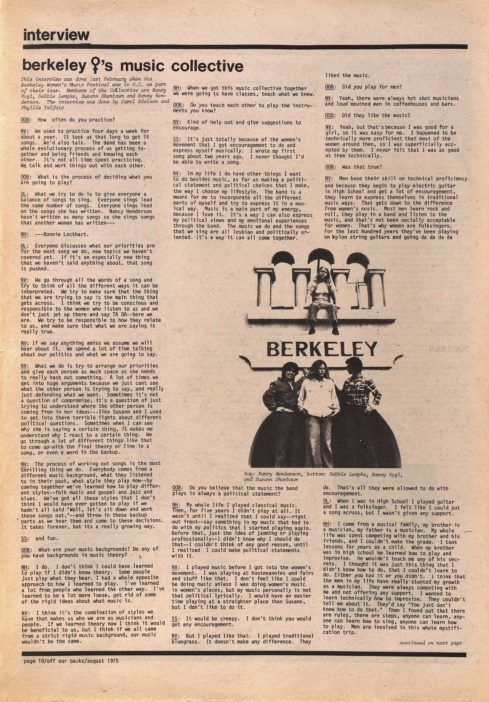The Berkeley Women’s Music Collective was not just a band, they were a collective. Initially they planned to teach classes and offer opportunities for women to play music with each other but as the collective evolved, they realized that their original ideas were too lofty for starting out.
What the band did keep was the collective spirit. In this interview, Debbie Lempke describes the egalitarian approach to song writing where “everyone sings lead on the same number of songs.” The women in the band discuss all their politics as a group and try to think about the different ways their songs could be interpreted.
The band’s collective politics heavily aligned with the politics of the women’s liberation movement. The emerging women’s culture encouraged the Berkeley Women’s Music Collective’s musical expression and fueled the band’s success. The women in the Collective saw the band as a way for them to contribute to the movement and have their voices heard.
*
In recent interviews, Debbie Lempke and Nancy Vogl expand upon the band’s politics and goals.
Lily: Would you say that one of the main functions of the band was to contribute to this emerging women’s movement?
Debbie: Oh, definitely. We were cultural workers, that’s how they would put it. I think everyone was definitely on the same page, about that, it was like a calling. It was like a passion and we really, really believed in what we were doing. It was very meaningful.
Nancy: Our band was focused on supporting the challenges to capitalism and patriarchy, which we felt were the true oppressors. That was the inception of how we got together. This was happening in similar enclaves all over the United States and pretty soon, you could tour from San Francisco to Australia with women in small towns and big cities putting on concerts. At one time there were women’s production companies all over the United States. I feel like we played half of the Unitarian church basements from here to New York because a member would give us use of the basement for 50 bucks and all the women would come from town.
The women’s studies movement was built on the model of African American studies, and women were asserting their voice in higher education. There was almost always a feminist professor in every town. She would get the school to sponsor us in a student union or something and then those also became concert venues where we would play from here to New York. It was also great because the college would pay us.
It doesn’t matter in the state, but there’s always one town, like Berkeley or, Chapel Hill, or Yellow Springs – always one university’s the most progressive. Those allowed us to hop-scotch across the States.
***
However, being a political band did not come without its hardships. “We never got to just sort of play in the background. From day one people were dead silent and hanging on everything. It was intense” Debbie Lempke recalls.
